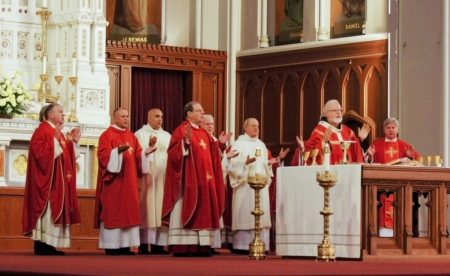Legalizing suicide 'sends a terrible message,' cardinal tells jurists
SOUTH END -- An American fighter pilot, gunned down during World War II, believed he would die in the burning carcass of his plane, behind enemy lines. He regained consciousness in the bed of a German farmer to find his wounds dressed.
Cardinal Seán P. O'Malley told this updated version of Jesus' parable of the Good Samaritan to judges, lawyers and court officials gathered at the Red Mass, held at the Cathedral of the Holy Cross on Sept. 30.
The annual Mass, named for the celebrants' red vestments, is sponsored by the Catholic Lawyers' Guild of the Archdiocese of Boston to begin the judicial year.
"The young American pilot, like the man left for dead on the road to Jericho, was shocked to find mercy where he felt it would never be found. He was forced to see a neighbor in one he considered an enemy," Cardinal O'Malley said.
Galilean peasants, Jesus' original audience for the parable, would have identified with story's victim, adopting the "view from the ditch."
"They would easily have imagined themselves lying there in the gutter, stripped, beaten, helpless, unable to move," he said. "The victim of the crime would realize that accepting mercy from one regarded as an enemy would challenge him to see every person as a neighbor."
They would also have understood the implication that God's healing and mercy can be received only after one has reached the depths of need -- stripped of everything, including hatred and prejudice.
"This parable speaks to us about how believers in the Commonwealth of Massachusetts must view the ballot initiative on assisted suicide. Mercy means caring for the dying -- doing all in our power to let them die surrounded by love," he said.
Massachusetts Question 2, "Prescribing Medication to End Life," will appear on the November ballot. The legislation would permit individuals who are given six months or fewer to live to receive life-ending drugs. Polls say the measure has plurality support, and its opponents worry that voters may be unaware of the long-term implications of such a law. Its supporters use terms like "death with dignity" and call ending life "compassion."
Cardinal O'Malley said that the death of loved ones spurs a host of emotions, adding, "Laws born of pure emotion are not good for any of us."
Legalizing suicide "sends a terrible message." Laws that do so set arbitrary death forecasts, which are often inaccurate. The Massachusetts law in particular lacks basic safeguards. It offers more protections to those who assist in premeditated suicide than those on the receiving end of a lethal dose of drugs, he said.
In almost all cases, dying patients can be made comfortable with pain medication. The best palliative and hospice care should be made available to all, and anything else is an "ugly distraction," he added.
Cardinal O'Malley urged attendees at the Red Mass to build a society where people are more important than money.
"May your faith light the path of reason and bring you joy and satisfaction as you work for a more just world," he said.
He urged the lawyers to see their profession as a vocation, to integrate their legal, professional and family lives with prayer and deep principles. He acknowledged the challenge of doing so in today's culture, which has been invaded by moral relativism. Religion is often viewed as a "quirky hobby," something separate from professional life.
"In reality, religion makes an indispensable contribution to our democratic way of life," he said. "The place of religion and religious convictions in public life is precisely to sustain those values that make possible a common good that is more than just a temporary political expedience motivated by personal convenience or gain."



















